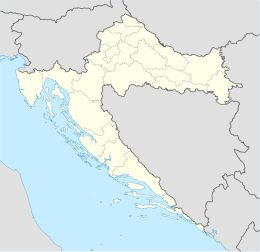Island of Šarengrad
Native name: Šarengradska ada Шаренградска ада | |
|---|---|
 View to the island | |
 Island of Šarengrad | |
| Geography | |
| Location | Danube River |
| Coordinates | 45°15′29″N 19°14′42″E / 45.258°N 19.245°ECoordinates: 45°15′29″N 19°14′42″E / 45.258°N 19.245°E |
| Total islands | 1 |
| Administration | |
Serbia/Croatia (disputed) | |
Island of Šarengrad (Serbo-Croatian: Šarengradska ada / Шаренградска ада, pronounced [ʃǎreŋgradskaː ǎːda] or [-ǎda]) is a Danube river island situated on the Croatian and Serbian border, across the Croatian village of Šarengrad. It covers an area of 9 km2 (3.5 sq mi).[1] The island is a part of the broader Croatia–Serbia border dispute concerning demarcation of the two countries along the Danube.
History[]
Old riverbed of the Danube caused problems for the navigation due to its heavy bending in this area. In order to solve the problem, Austria-Hungary began digging the canal which would straighten the flow of the river in 1892. After 17 years, the Mohovo-Šarengrad canal was finally finished in 1909, and as a result the Island of Šarengrad was formed.[1][2] The newly dug canal would gradually widen and become the main flow of the river, while the former riverbed would become an anabranch. Thus, the island was effectively moved close to the left bank that will eventually become part of Serbia.
During the Socialist Federal Republic of Yugoslavia the island was part of the Socialist Republic of Croatia. During the Croatian War of Independence, Yugoslav People's Army and Serbian militia occupied the island.[citation needed]
It was the opinion of the Badinter Arbitration Committee that the borders between republics should become the borders between the countries,[3][4][5][6]
In 1998, through the Erdut Agreement, Eastern Slavonia, Baranja and Western Syrmia was reintegrated with Croatia. However, the Island of Šarengrad together with Island of Vukovar has stayed under Serbian military control.[citation needed]
In 2002 the Serbian army opened fire from the island on the prefect of the Vukovar-Syrmia County, Nikola Šafer, and his escort which included four children in time when he was going for a meeting with his colleague from Serbia. This was despite the party having had formal consent from Serbian officials.[7][8]
In 2004 Serbia withdrew its army from the island, which has been replaced with Serbian police. Any citizen of Croatia can approach that island crossing the border Bačka Palanka - Ilok. Land registration books are managed by Croatian authorities, but the Serbian side does not recognise these ownerships.[citation needed] In 2009, the island was opened up for recreational purposes after a temporary arrangement was established.[2]
In his a statement for daily newspaper Novi list in February 2012 Croatian President Ivo Josipović said that two countries need flexible solution for border disputes on Danube river that would be combination of solutions proposed by two countries.[9] Croatian president said whatever solution would be adopted it would be good that Island of Vukovar eventually found on the Croatian side of border.[9] In his statement President made no mention of the second Danube island, Island of Šarengrad.[9]
References[]
- ^ Jump up to: a b Jelena Cerovina (4 July 2017), "Granica na Dunavu između Habzburga i Badintera", Politika (in Serbian), p. 06
- ^ Jump up to: a b "Od ljeta dostupna i Šarengradska ada, Vjesnik". vjesnik.hr. Retrieved 11 June 2017.[permanent dead link]
- ^ The Opinions of the Badinter Arbitration Committee: A Second Breath for the Self-Determination of Peoples Archived May 17, 2008, at the Wayback Machine
- ^ "Geografija.hr". Archived from the original on 15 April 2008. Retrieved 11 June 2017.
- ^ "Request Rejected". www.morh.hr. Retrieved 11 June 2017.
- ^ "Ured predsjednika RH - kolovoz". Archived from the original on 10 June 2007. Retrieved 11 June 2017.
- ^ "Slobodna Dalmacija: 29". www.hsp1861.hr. Retrieved 11 June 2017.
- ^ DPI - Foreign Media Monitoring Archived April 16, 2008, at the Wayback Machine
- ^ Jump up to: a b c "HR za fleksibilno rešenje granica". Retrieved 11 June 2017.
- Islands of the Danube
- River islands of Croatia
- Syrmia
- Geography of Vukovar-Syrmia County
- Croatia��Serbia border
- River islands of Serbia
- Territorial disputes of Croatia
- Territorial disputes of Serbia

